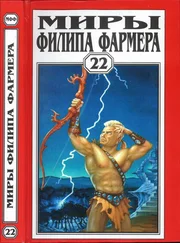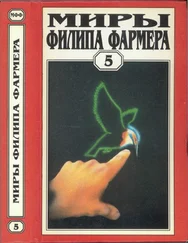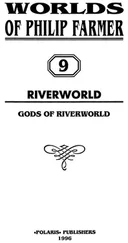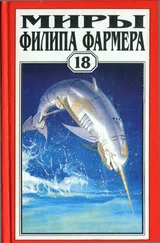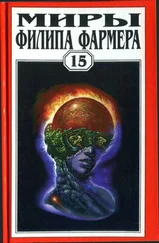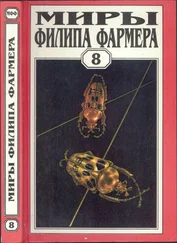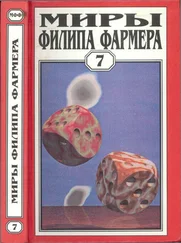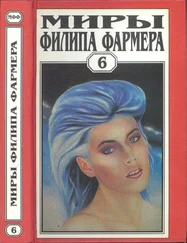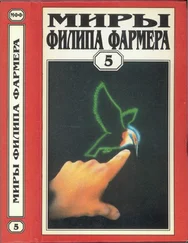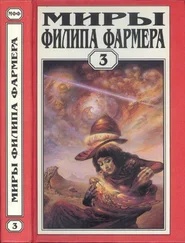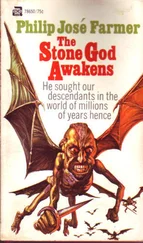Филип Фармер - The Lovers
Здесь есть возможность читать онлайн «Филип Фармер - The Lovers» весь текст электронной книги совершенно бесплатно (целиком полную версию без сокращений). В некоторых случаях можно слушать аудио, скачать через торрент в формате fb2 и присутствует краткое содержание. Жанр: Фантастика и фэнтези, на английском языке. Описание произведения, (предисловие) а так же отзывы посетителей доступны на портале библиотеки ЛибКат.
- Название:The Lovers
- Автор:
- Жанр:
- Год:неизвестен
- ISBN:нет данных
- Рейтинг книги:5 / 5. Голосов: 1
-
Избранное:Добавить в избранное
- Отзывы:
-
Ваша оценка:
- 100
- 1
- 2
- 3
- 4
- 5
The Lovers: краткое содержание, описание и аннотация
Предлагаем к чтению аннотацию, описание, краткое содержание или предисловие (зависит от того, что написал сам автор книги «The Lovers»). Если вы не нашли необходимую информацию о книге — напишите в комментариях, мы постараемся отыскать её.
The Lovers — читать онлайн бесплатно полную книгу (весь текст) целиком
Ниже представлен текст книги, разбитый по страницам. Система сохранения места последней прочитанной страницы, позволяет с удобством читать онлайн бесплатно книгу «The Lovers», без необходимости каждый раз заново искать на чём Вы остановились. Поставьте закладку, и сможете в любой момент перейти на страницу, на которой закончили чтение.
Интервал:
Закладка:
Hal knew that when that side of Earth rotated into the night zone, Sigmen City would blaze out into space. And, somewhere in that enormous light, was his apartment. But Mary would soon no longer be living there, for she would be notified in a few days that her husband had died in an accident. She would weep in private, he was sure, for she loved him in her frigid way, though in public she would be dry-eyed. Her friends and professional associates would sympathize with her, not because she had lost a beloved husband, but because she had been married to a man who thought unrealistically. If Hal Yarrow had been killed in a crash, he must have wanted it that way. There was no such thing as an 'accident.' Somehow, all the other passengers (also supposed to have died in this web of elaborate frauds to cover up the disappearance of the personnel of the Gabriel) had simultaneously 'agreed' to die. And, therefore, being in disgrace, they would not be cremated and their ashes flung to the winds in public ceremony. No, the fish could eat their bodies for all the Sturch cared.
Hal felt sorry for Mary; he had a time keeping the tears from welling to his own eyes as he stood in the ciowd in the observation dome.
Yet, he told himself, this was the best way. He and Mary would no longer have to tear and rend at each other; their mutual torture would be over. Mary was free to marry again, not knowing that the Sturch had secretly given her a divorce, thinking that death had dissolved her marriage. She would have a year in which to make up her mind, to choose a mate from a list selected by her gapt. Perhaps, the psychological barriers that had prevented her from conceiving Hal's child would no longer be present. Perhaps. Hal doubted if this happy event would occur. Mary was as frozen below the navel as he. No matter who the candidate for marriage selected by the gapt...
The gapt. Pornsen. He would no longer have to see that fat face, hear that whining voice...
'Hal Yarrow!' said the whining voice.
Slowly, icy yet burning, Hal turned.
There was the squat, loose-jowled, thick-lipped, vulture-nosed, narrow-eyed man smiling at him. Under the narrow-brimmed conical azure hat, gray-flecked black hair hung down to a high-ruffed black collar. The azure jacket fit snugly over a large paunch – Pornsen had endured many a lecture from his superiors because of his overeating – and a broad blue belt held a metal clasp for the handle of his whip. The thick legs were enclosed in tight azure pants with a black stripe running vertically along the outer and inner sides and with azure knee-high boots. The feet, however, were so tiny they looked ridiculous. On the toes of each boot was a seven-sided mirror.
There were some dirty stories about the origin of the mirrors circulating among lower-class elements. Hal had once overheard one, and he still blushed whenever he recalled it.
'My beloved ward, my perennial gadfly,' Pornsen whined. 'I'd no idea that you would be on this glorious voyage. But I might've known! We seem to be bound by love. Sigmen himself must have foreseen it. Love to you, my ward.'
'Sigmen love you, too,' Hal said, and he coughed. 'How wonderful to see your cherished self. I had thought we'd never see each other again.'
The Gabriel pointed toward her destination and, under one-gee acceleration, began to build toward her ultimate velocity, 33.1 percent of the speed of light. Meanwhile, all the personnel except those few needed to carry out the performance of the ship went into the suspensor. Here they would lie in suspended animation for many years. Some time later, after a check had been made of all automatic equipment, the crew would join the others. They would sleep while the Gabriel's drive would increase the acceleration to a point which the unfrozen bodies of the personnel could not have endured. Upon reaching the desired speed, the automatic equipment would cut off the drive, and the silent but not empty vessel would hurl toward the star which was its journey's end.
Many years later, the photon-counting apparatus in the nose of the ship would determine that the star was close enough to actuate deceleration. Again, a force too strong for unfrozen bodies to endure would be applied. Then, after slowing the vessel considerably, the drive would adjust to a one-gee deceleration. And the crew would be automatically brought out of their suspended animation. These members would then unthaw the rest of the personnel. And, in the half-year left before reaching their destination, the men would carry out whatever preparations were needed.
Hal Yarrow was among the last to go into the suspensor and among the first to come out. He had to study the recordings of the language of the chief nation of Ozagen, Siddo. And, from the first, he faced a difficult task. The expedition that had discovered Ozagen had succeeded in correlating five thousand Siddo words with an equal number of American words. The description of the Siddo syntax was very restricted. And, as Hal found out, obviously mistaken in many cases.
This discovery caused Hal anxiety. His duty was to write a school text and to teach the entire personnel of the Gabriel how to speak Ozagen. Yet, if he used all of the little means at his disposal, he would be instructing his students wrongly. Moreover, getting even this across would be difficult.
For one thing, the organs of speech of the Ozagen natives differed somewhat from Earthmen's; the sounds made by these organs were, therefore, dissimilar. It was true that they could be approximated, but would the Ozagenians understand these approximations?
Another obstacle was the grammatical construction of Siddo. Consider the tense system. Instead of inflecting a verb or using an unattached particle to indicate the past or future, Siddo used an entirely different word. Thus, the masculine animate infinitive dabhumaksani-galu'ahai, meaning to live, was, in the perfect tense, ksuupeli'afo, and, in the future, mai'teipa. The same use of an entirely different word applied for all the other tenses. Plus the fact that Siddo not only had the normal (to Earthmen) three genders of masculine, feminine, and neuter, but the two extra of inanimate and spiritual. Fortunately, gender was inflected, though the expression of it would be difficult for anybody not born in Siddo. The system of indicating gender varied according to tense.
Other parts of speech – nouns, pronouns, adjectives-adverbs, and conjunctions – operated under the same system as the verbs. To confuse the use of the tongue, different social classes quite often used different words to express the same meaning.
The writing of Siddo could only be compared to that of ancient Japanese. There was no alphabet; instead, ideograms, lines whose length, shape, and relative angle to each other were meaningful, were used. Signs accompanying each ideogram indicated the correct inflection of gender.
In the privacy of his study cubicle, Hal swore mildly by the lost right hand of Sigmen.
The captain of the first expedition had picked out the continent in the Ozagenian antipodes as his base for research. This happened to be occupied by natives who spoke the most difficult language (for Earthmen) to master. If he had chosen the other continent in the northern hemisphere, he could have had (rather, his linguist could have had) forty different tongues to choose from, some of them comparatively easy in their syntax and with short words. That is, they were if Hal could believe the random sample of them that the linguist had taken.
Siddo, the land mass in the southern hemisphere, was about the size, though not the shape, of Africa and was separated from the other by ten thousand miles of ocean. If the wog geologists were correct, it had once been part of a Gondwanaland, but then it had drifted away. Evolution had then taken a somewhat different path from that on the other continent. Whereas the other continent had been dominated by insects and their distant cousins, the endoskeletal pseudoarthropods, this land mass had been very hospitable to mammals. Though, Sigmen knew, there was an abundance of insect life on it.
Читать дальшеИнтервал:
Закладка:
Похожие книги на «The Lovers»
Представляем Вашему вниманию похожие книги на «The Lovers» списком для выбора. Мы отобрали схожую по названию и смыслу литературу в надежде предоставить читателям больше вариантов отыскать новые, интересные, ещё непрочитанные произведения.
Обсуждение, отзывы о книге «The Lovers» и просто собственные мнения читателей. Оставьте ваши комментарии, напишите, что Вы думаете о произведении, его смысле или главных героях. Укажите что конкретно понравилось, а что нет, и почему Вы так считаете.

